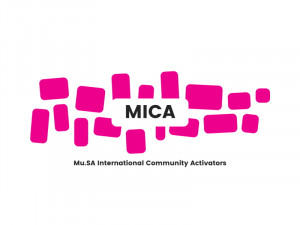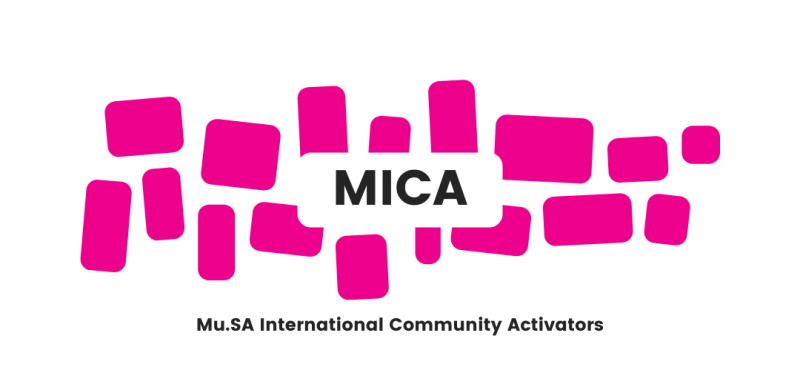 The DAISSy research group of the Hellenic Open University (http://daissy.eap.gr/en/ ) participates in the activities of the project “MU.SA International Community Activators – MICA”, which is co-funded by the Erasmus+ 2021-2027 programme. The MICA project (12 months duration) aims to create a practical community of self-lifelong learning for Cultural Heritage and Museums professionals. Up to now, have been successfully completed the first three out of the five Work Cafés within the MICA project, which were conducted online and were live streamed on project’s Facebook page.
The DAISSy research group of the Hellenic Open University (http://daissy.eap.gr/en/ ) participates in the activities of the project “MU.SA International Community Activators – MICA”, which is co-funded by the Erasmus+ 2021-2027 programme. The MICA project (12 months duration) aims to create a practical community of self-lifelong learning for Cultural Heritage and Museums professionals. Up to now, have been successfully completed the first three out of the five Work Cafés within the MICA project, which were conducted online and were live streamed on project’s Facebook page.
On March 28th 2022, the 1st Work Café on “Digital Environment for the Mu.SA Community” was held with the keynote speaker Myriam Hadnes, who shared with her experience of digital platforms as a behavioral economist and host of the podcast “Workshops Work” with the participants. The second guest was Sherif Abaza, Chief Growth Officer of Withlocals, a company specializing in affordable and sustainable tourism promoted by locals and an expert on the Slack platform. The speakers answered the questions and then, in the second part of the Work Café, participants explored the Welo platform and discussed, in small groups, the topics of the talks and how a community could be not only attractive but also sustainable.
On April 4th 2022, MICA project hosted the 2nd Work Café on “Best practices in cultural communities” where examples of successful cultural communities were presented and questions were raised about their potentials and weaknesses and how the MICA community can develop its own potentials. The first speaker, Maria Ann McNair, museum educator at History Colorado Museum, described how storytelling can be the strongest tool to create empathy, connection and networking in the process of building a community. Also, hosted Harikleia Haris, architect, urban planner and Mu.SA course successful learner from Greece, who described to participants how different digital platforms are used by different digital communities around the world, how to measure their impacts and the importance of balancing online and offline cultural community’s elements. In the second part of the Work Café, on the Welo platform, the speakers’ contributions deepened and discussed ways of building and feeding a digital or even physical (face-to-face) community which is open to the exchange of knowledge and experiences but also to critiques based on trust and respect.
The 3rd Work Café was dedicated to “Best practices in non-cultural communities” and took place on April 11th 2022. The main focus of the discussion was the participation of community members in the community and how to keep it active. The first speaker was Stella Tsala, head of the Cookpad Greek community, who described the three groups into which a digital community can be divided, the role that each group has and finally, how these groups can contribute to the development and maintenance of the community. Then, Susana Gomes da Silva, Head of education of the Gulbekian Museum in Lisbon, Portugal explained to the participants how museums keep in touch with their communities. The last speaker was Lana Jelenjev, author and “alchemist” of communities, who highlighted the importance of different ways of reaching out to members of a community. Participants, in the second part of the Work Café, were again moved to Welo platform where they exchanged views on the speakers’ key topics and discussed new strategies.
On May 2nd 2022 will be organized the 4th Work Café, entitled “Crowdfunding strategies and tools” with keynote speaker Zoe Akrivouli, Economist and researcher of the DAISSy group of the Hellenic Open University.
View the next work cafés livestreamed in Facebook of MICA project!
For more information about the MICA project and the activities of the DAISSy research group:
- Websites: https://micaproject.eu/ – http://daissy.eap.gr/en,
- Facebook: @micaproject – @DAISSyResearchGroup
- LinkedIn: https://www.linkedin.com/showcase/m-i-c-a-mu-sa-international-community-activators – https://www.linkedin.com/in/daissyresearchgroup/
- Twitter: https://twitter.com/daissy_research
- Instagram: @daissy_researchgroup
- Email: info@daissy.eap.gr

